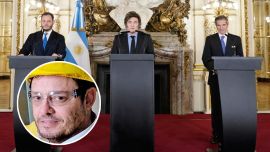Argentina’s final presidential debate showcased Economy Minister Sergio Massa relentlessly attacking the proposals of libertarian outsider Javier Milei, putting him on the defensive and letting the government candidate get away without having to explain specifics of his own plan.
Before the definitive run-off election on November 19, Massa and Milei faced off on Sunday night with a new debate format that allowed for more sparring between the two than in previous editions. That allowed Massa to pepper Milei with “yes or no” questions about his rival’s most controversial proposals, including closing the Central Bank, dollarising the economy and privatising education.
“Yes or no, are you going to close the central bank?” Massa fired at Milei, who mostly focused on answering each question instead of interrogating Massa on his own policy platforms. Milei ultimately replied, “yes, we’ll dollarise the economy and we’ll close the Central Bank.”
Meanwhile, Milei spent much of the debate clarifying his own proposals, telling Massa to “stop lying” about his past comments and making the showdown about his presidential capacities. As Milei raised his voice early in the debate, Massa quipped, “It’s a long debate, don’t get aggressive.”
The outsider candidate barely pressured Massa on any specifics of his economic policies or how he would tackle Argentina’s 138 percent annual inflation, which he hasn’t outlined throughout the campaign. The lack of economic details disappointed economists including Martin Castellano, head of Latin America research at the Institute of International Finance.
“Nobody expected specifics on harsh measures, but at least a reference to inflation and how to take it seemed obvious,” Castellano posted on social media. “Missed opportunity to unveil upcoming economic policy.”
Milei criticised the current government’s track record on education, post-pandemic and protectionist trade policies.
“I want free trade and you want to close the economy,” he shot at Massa.
Ahead of the debate, most polls — many of which have showed a shaky track record for accuracy in the past — have Milei narrowly ahead of Massa in voter preference, though his lead appears within the margin of error. The libertarian candidate captures 52 percent of vote intention compared to Massa’s 48 percent, according to a poll released November 10 by Brazil-based consulting firm AtlasIntel, which was among the most accurate in the first round last month.
Argentines face a polarising decision in next week’s election between the continuity model proposed by Massa and the radical shake-up pledged by Milei. The economy minister has failed to cool triple-digit inflation, present a credible economic plan and comply with the government’s US$43-billion International Monetary Fund programme. On the other hand, Milei spooks most mainstream economists in Buenos Aires, who worry that his policy proposals, including swapping the peso for the US dollar, could bring about hyperinflation.
The runoff’s winner will take office December 10 and inherit titanic challenges. Over 40 percent of Argentines live in poverty, the economy is expected to contract again this year, while the government has no access to international capital markets and dwindling central bank reserves are at their lowest level in nearly two decades.
by Patrick Gillespie, Bloomberg




















Comments